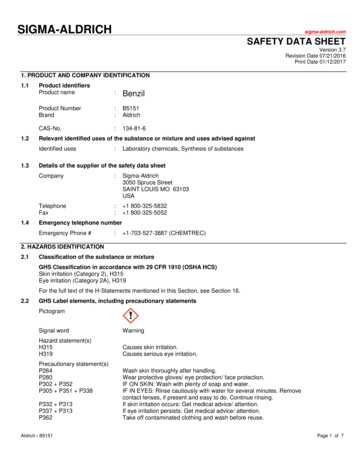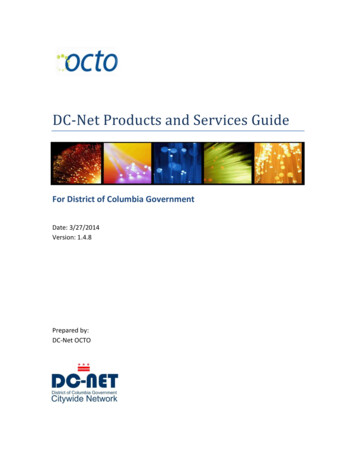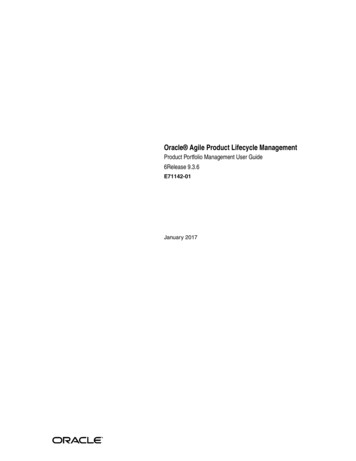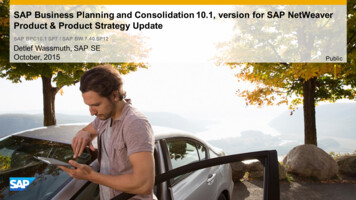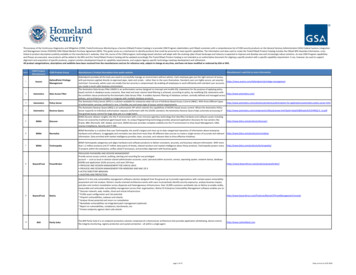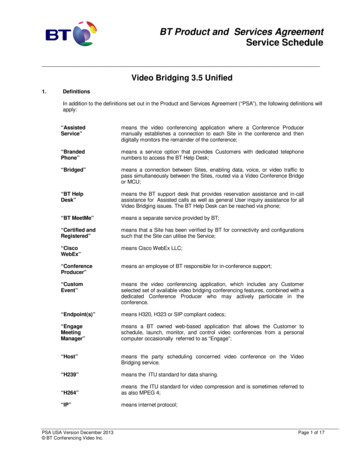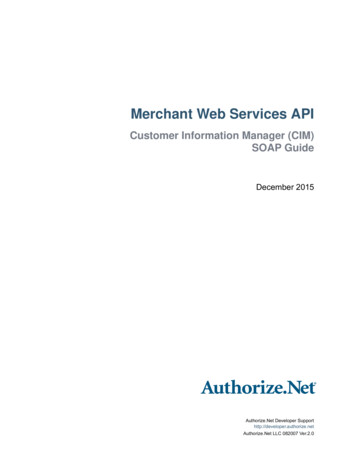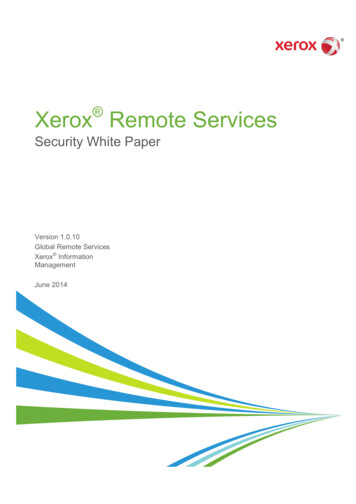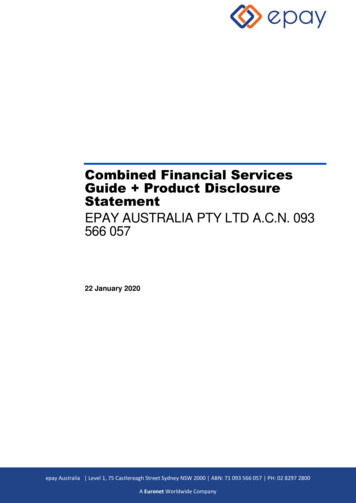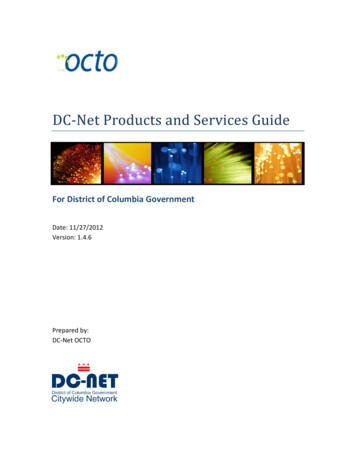
Transcription
DC-Net Products and Services GuideFor District of Columbia GovernmentDate: 11/27/2012Version: 1.4.6Prepared by:DC-Net OCTO
Table of ContentsAbout DC-Net . 5Network Features. 6About this Guide . 7Data Networking. 8MPLS VPN Managed Circuits. 8Features and Benefits . 8Technical Overview . 9Ethernet. 10Wavelengths. 11Wavelength Transport . 11Fractional Wave Transport . 12Network Monitoring . 12Voice . 14Voice Services. 14VoIP Managed Service . 15Digital . 16Analog . 16Non-DID. 16Voice Managed Services . 17Call Center Solutions . 17Key Features. 17Key Benefits . 18Applications and Architecture . 18E-Fax . 23Web Conferencing . 24Key Benefits . 25Features . 25Options . 26DC-Net Products and Services Guide2
Audio Conferencing . 26Monthly . 26On Demand . 26Unified Messaging. 27Voice Features . 28Standard Features . 28Free Ala Carte Features. 29Ala Carte Features. 29EC500 . 30Voicemail. 31Phone Sets . 31Avaya VoIP Phones and Peripherals . 31Avaya 9621G IP . 32Avaya 9641G IP . 32Avaya 9650 IP . 33Avaya 9670G IP . 34Avaya 1692 IP . 35Avaya 9600 Series IP Phone Expansion Module . 36Avaya Digital Phones – 2420 . 36Avaya IP Phone Comparison Matrix . 38Cisco Unified IP Phones. 39Video Phone – 9971 . 397965G . 407962G . 407945G . 417942G . 41Cisco Wi-Fi Enabled Phone – 7925G . 42Cisco Conference Bridge – 7937G. 43Headsets . 43Cisco Unified IP Phone Feature Comparison . 45Video Teleconferencing. 47Unlimited Point-to-Point Video . 48DC-Net Products and Services Guide3
Multi-Port Bridging Options . 48Monthly Bridging . 48On-Demand Bridging . 49Cisco/Tandberg HD Endpoint Options . 49Immersive Solutions. 50Multi-Purpose Conference Room . 50Desktop Telepresence. 51Jabber Video Client . 51Video Phone . 52Video Conference Recording and Sharing . 52Architecture Highlights . 53Wireless. 54Wireless LAN . 54Benefits . 54Services . 55Technology . 56Installation and Management. 56Outdoor Wi-Fi. 57Future Applications . 57Professional Services. 58Ordering Products and Services . 59Non-District Government Customers . 59Non-Central Agency Pay Process . 59Central Pay District Government Customers . 60Order Fulfillment . 62Getting Help . 63Glossary. 64Index . 66DC-Net Products and Services Guide4
About DC-NetDC-Net is a facilities-based Metropolitan Area Network run by the District of ColumbiaOffice of the Chief Technology Officer (OCTO) that provides a full suite of managed,interconnection and transport services to government and public services organizationsin the District of Columbia.DC-Net is the “first mile” for all District government networking and is the first buildingblock of any economic development or digital divide initiative that requires a network. Itdelivers Internet and network services to public schools, public libraries, communitycenters, hospitals and clinics, public safety agencies, administrative offices, and publiclyavailable Wi-Fi networks. The DC-Net program currently operates over 27,000 phonelines and 400 data circuits spanning over 400 locations. It serves 90 District entities, witha priority on education, public safety, and health care.DC-Net manages a portfolio of approved vendors and contract vehicles to purchasetelecommunications products and services in compliance with procurement guidelinesand works with all District agencies to monitor and certify telecommunicationsinventories (landlines, cellular devices, pagers, data circuits) to best manage overalltelecommunications operations. DC-Net also carries all wireless traffic associated withOCTO’s 350 wireless “hotspots” throughout the city, including the National Mall.DC-Net’s mission is to: Spearhead the delivery of reliable and secure data and telecommunicationservices within the District. Deliver cost effective, best-of-breed, and value-added products and services. Improve access to affordable broadband services for community anchorinstitutions, public safety entities, and District residents and businesses—particularly in underserved areas. Provide dependable 24/7 technical support with timely problem resolution.DC-Net Products and Services Guide5
Network FeaturesThe DC-Net network is a public safety-grade network providing reliable communicationlinks for critical government services. Key features include: One-stop shopping. Unrivaled ability to offer a full range of customizedtelecommunications services to meet government needs in the District. Cost savings. A full offering of up-to-date telecommunications products andservices at a savings over commercial service providers. High availability and reliability through redundant fiber optic connections. Fullfailover in the event of a fiber cut or equipment failure. End-to-end security on all links, fully managed by OCTO. Public safety-grade communications allows emergency first responders tocommunicate across National Capitol Region. Responsive service and round-the-clock technical support. Fully staffed, knowledgeable Support Services personnel able to walk youthrough the ordering process.As shown in Figure 1, DC-Net’s fiber optic network is the resilient high-speed core for allproducts and services DC-Net provides, from digital voice to VPN data, Voice overInternet Protocol (VoIP), and video services which use IP-based networking.DC-Net Products and Services Guide6
Figure 1: DC-Net ServicesAbout this GuideThe DC-Net Products and Services Guide provides up-to-date descriptions of availableDC-Net products and services and gives guidance on the ordering process. Thisdocument is available in PDF online at the DC-Net website: www.dcnet.dc.gov.DC-Net Products and Services Guide7
Data NetworkingDC-Net offers Layer 3 Managed VPN data services, Layer 2 Ethernet over MPLS services,and Layer 0/1 wavelength services for District government agencies.MPLS VPN Managed CircuitsDC-Net MPLS VPN-based data networking services for District government providemanaged, secure communications at a range of access speeds from 10 Mbps to 1 Gbpsand costs to fit your agency’s budget. This service includes Internet access, 24 x 7 x 365network monitoring and support, and a quality of service (QoS) service level agreement(SLA).With the VPN (Virtual Private Network) managed service, your traffic is secured andseparated from other customers’ traffic on the network through the use of VPNtunneling.VPN services enable data quality monitoring and prioritization—ensuring that real-timecritical applications, such as voice and video, are queued first. It is also less expensivethan traditional leased lines or remote access servers.Features and Benefits Multiple access and port speeds – VPN services offer link speeds of 10 Mbps, 50Mbps, 100 Mbps, and 1 Gbps, with 10 Mbps and 100 Mbps increments Dual-homed, diversely routed paths; built in disaster recovery Pricing includes access and transport Dedicated 24x7 network monitoring and customer support Prioritization of real-time sensitive data; guaranteed quality of service andpacket delivery suitable for all traffic (including VoIP) Demonstrated 99.999% network uptime; network performance and availabilitybacked by SLA Internet connectivity Secure government-only networkDC-Net Products and Services Guide8
Direct connectivity to District government data centers for District governmentservices and resources Direct connectivity to carrier hotels, available public and private peering pointsfor interconnection and offsite data storage/recovery Private connection to other District government and community anchors onnetwork Metro Ethernet backbone with core ring speed of 10 Gbps, OC-48 SONETbackbone with sub-50 ms failover and architectural design that allows for easysite expansion. Prices lower than commercial service providersTechnical OverviewDC-Net VPN services provide secure, reliable transport of critical applications across ahigh-speed IP backbone infrastructure. The network uses industry leading switching androuting protocols, primarily the Multiprotocol Label Switching (MPLS) protocol. MPLSadds performance and resilience; including the ability to assign performance guaranteesfor each VPN tunnel.DC-Net’s backbone metro fiber rings run the Synchronous Optical NetworkingTechnology (SONET) protocol supporting aggregate speeds of 2.5 Gbps. The protocolruns the Resilient Packet Ring (RPR) technology which enables load-sharing and pathprotection between redundant fiber routes. Automatic failover in case of a fiber breakor electronic failure happens within 50 ms without affecting any customer traffic.At remote sites, Virtual Local Area Networks (VLANs) are used to identify sets of devices(computers, phones, video conferencing) as having access to a particularcommunications channel and a particular type of access.Figure 2 shows how agency traffic flows over VPN connections between customerremote sites on Access Rings, the main office site, and the OCTO data center. Remotesites have fully redundant fiber from the site to the backbone carrying Ethernet traffic.At the DC-Net fiber optic Metro Ring hub sites, this communication channel isconnected to a VPN tunnel to traverse the SONET backbone to the data centers and/oranother location, such as a main office. Metro Rings are fully fiber optic and have fullphysical path redundancy.DC-Net Products and Services Guide9
Figure 2: VPN Service (District Government Customer)EthernetDC-Net Layer 2 Ethernet over MPLS service offers point-to-point and point-to-multipointtransport over 10 Mbps to 10 Gbps circuits for District Government agencies. Layer 2services are offered over the MPLS platform built over a protected Dense WavelengthDivision Multiplexing (DWDM) ring.Key features include: Dual-homed, diversely routed paths; built in disaster recovery Pricing includes access and transport Available as un-encrypted or encrypted Supports rate limiting Dedicated 24x7 network monitoring and customer support 99.999% availability Direct connectivity to District government data centers for services andresources Direct connectivity to core exchanges Available public and private peering points for interconnection and offsite datastorage/recoveryDC-Net Products and Services Guide10
Private connection to other District government and community anchors onnetworkWavelengthsDC-Net offers shared and dedicated wavelengths with point-to-point or point-tomultipoint configuration. Wavelengths are provisioned over a ring between desiredlocations.The DC-Net network uses Wave Division Multiplexing (WDM) technology, whichtransmits multiple wavelengths over a single optical fiber; each data signal has its ownwavelength.Peering can be done using Ethernet, FC/FICON, SONET or direct wave (OTN) interfaces.Key features include: Dual-homed, diversely routed paths; built in disaster recovery Pricing includes access and transport Dedicated 24x7 network monitoring and customer support 99.999% availability Direct connectivity to District government data centers for services andresources Direct connectivity to core exchanges in Washington, DC Available public and private peering points for interconnection and offsite datastorage/recoveryWavelength TransportAvailable services: OTU - 2.5 Gbps OTU2 - 10 Gbps OTU2e - 11.1 Gbps OTU3 - 40 GbpsDC-Net Products and Services Guide11
Fractional Wave TransportAvailable services: 1 GigE 10GigE OC-3 OC-12 OC-48 OC-192Network MonitoringDC-Net customers receiving managed VPN services can now monitor their networkperformance through a secure, customer-only portal with the low-cost NetworkMonitoring monthly subscription service.Agencies can monitor and analyze realtime, in-dept
VPN services enable data quality monitoring and prioritization—ensuring that real -time critical applications, such as voice and video, are queued first. It is also less expensiv
